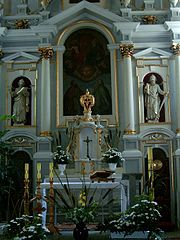
A History Of The Mass And Its Ceremonies In The Eastern And Western Church -Rev John O'Brien A.M.
INFLUENCE OF THE DISCIPLINE OF THE SECRET ON THE PREACHING
We wish here to call the particular attention of the reader to a fact which is too often lost sight of in treating of the customs of the early Church. We refer to the Discipline Arcani, as it was called, or the Discipline of the Secret, in virtue of which the principal mysteries of our holy faith and the nature of many of the public prayers of the Church were carefully concealed from all who were not considered as belonging to the household of faith, and this with a view to follow out to the letter that sacred admonition of our Divine Lord himself, viz.: not to “cast pearls before swine or give what was holy to dogs.” “The mysteries,” says St. Athanasius, “ought not to be publicly exhibited to the uninitiated, lest the Gentiles, who understand them not, scoff at them, and the catechumens, becoming curious, be scandalized” (Apol. contra Arian., p. 105).
The caution which was to be observed during the prevalence of this discipline—which, as we have said in another place, lasted during the first five centuries—influenced the preachers of those days very considerably, from the fact that their audiences were often made up of Jews, Gentiles, pagans, and others who were wholly ignorant of the nature of our belief, and who would, had they but understood it in all its bearings, have made it a pretext for inciting fresh persecution. This accounts for the thick veil of mystification that hung over many of the sermons of the early Fathers, and for the abruptness with which several of them ended. Many a time did St. Chrysostom break off his discourse with some such expression as this: “The initiated know what I mean.” This he would do if he saw any persons in the audience who did not belong to the faithful. “I wish to speak openly,” said he upon a certain occasion while addressing his flock, “but I dare not on account of those who are not initiated. These persons render explanation more difficult by obliging us to speak in obscure terms or to unveil the things that are secret; yet I shall endeavor, as far as possible, to explain myself in disguised terms” (Hom. xl in I. Corinth.) Tertullian, who lived in the second century under the Emperors Severus and Caracalla, says upon this subject: “The profane are excluded from the sight of the most holy mysteries, and those are carefully selected who are permitted to be spectators” (Apol. adversus Gentes).
The extreme reserve of St. Epiphanius (fourth century) when speaking upon the Blessed Eucharist is very remarkable. Lest he might make use of the slightest expression that would be calculated to excite the curiosity of the uninitiated, he has recourse to the following guarded language: “We see that our Lord took a thing into his hands, that he rose from the table, that he resumed the thing, and, having given thanks, said: ‘This is that of mine.’ ” “We should rather shed our blood,” says St. Gregory Nazianzen, “than publish our mysteries to strangers” (Orat., pp. 35 and 42).
Nor must we omit to mention that during those times swift-hand writers (ὀξυγράφοι) were sent around in bands by the pagans to take down whatever they heard preached in the Christian assemblies. Frequent mention of these is made by Sozomen and other historians; and, according to the testimony of St. Gregory Nazianzen (Thirty-third Sermon), he himself, while preaching, saw men of this kind stealing among the people and hiding, so as not to be detected in their work; and when they could hear nothing worthy of noting they would fabricate something, and often make the preacher say what was farthest from his intention. St. Gaudentius (427) bitterly inveighed against this clandestine practice (Riddle, Christian Antiquities, p. 457).
We have designedly dwelt upon this subject for the reason that Protestants are fond of saying that the early Fathers say little or nothing about the Real Presence of our Lord in the Holy Eucharist. Let them but remember that until the sixth century it was strictly forbidden to teach this doctrine openly, in virtue of the Discipline of the Secret, and they will cease to be surprised at this prudent silence. The historian Sozomen had so scrupulous a regard for this sacred Discipline that he would not commit to writing the Creed framed by the Council of Nicæa in A.D. 325, for this also came under the Secret.
Copyright ©1999-2023 Wildfire Fellowship, Inc all rights reserved

 Keep Site Running
Keep Site Running